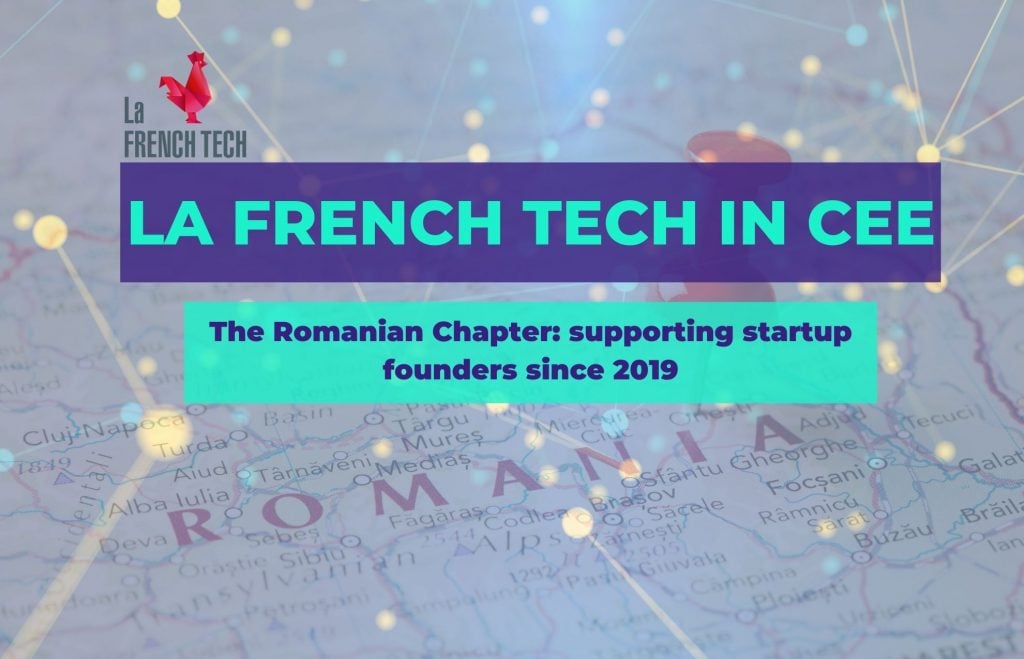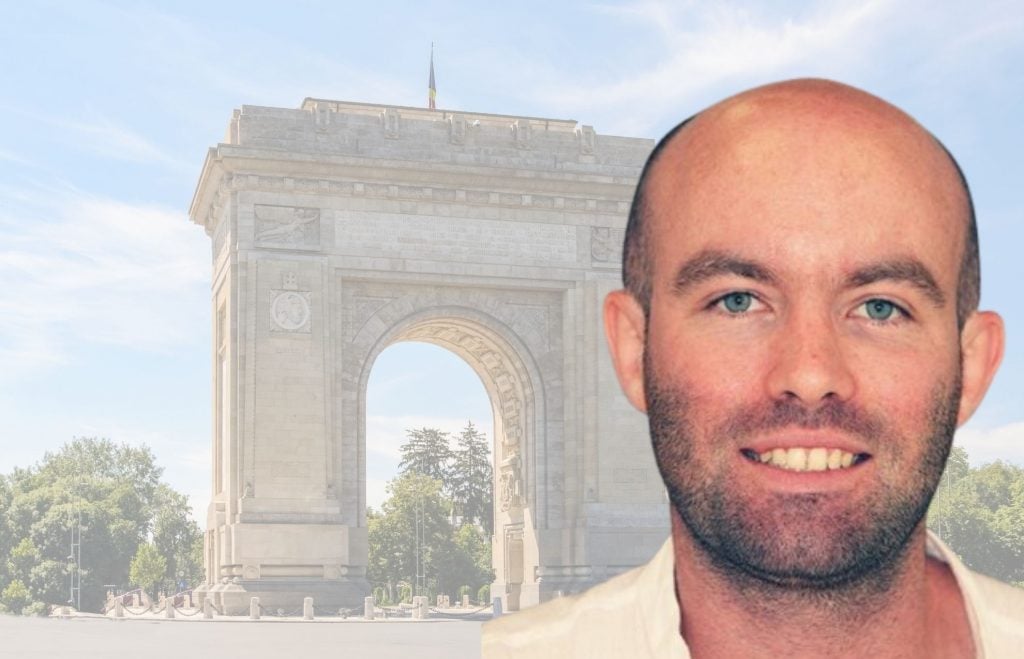Search for...

Welcome to our new series, diving deeper into the La French Tech community and getting to better understand French President Emmanuel Macron’s visionary target of turning France into a “startup nation” and Europe into a flourishing partnership playground. By 2030, the French government aims to focus its efforts in Europe, so the continent can support 10 tech giants worth €100B each.
This series will take us through different countries known for prosperous fields where tech innovation can flourish. We will begin in Bucharest, Romania, and continue the journey in Sofia, Bulgaria; Krakow, Poland, and Belgrade, Serbia.

"Since we launched in 2019, our mission at La French Tech in Romania is to act as a bridge and as a connector between the French and Romanian tech ecosystems to foster partnerships. To do so, we support the French startups to launch and succeed in Romania; and we do the same for the Romanian startups in France."
Grégoire Vigroux
Our host for the Romanian chapter is Grégoire Vigroux. The Bucharest-based serial entrepreneur, business angel, and President of La French Tech Bucharest fell in love visiting the country back in the ‘90s. Over a decade later, he launched his first company, named CallPoint at the time, and vouched to help other French entrepreneurs follow his path and join the zip code.
Grégoire’s background in international management has led him to co-found tech startups like bonapp.eco in Romania and invest in 20 businesses across Eastern Europe. He has had four exits so far, the latest with the refurbished smartphones online store Fenix, and believes:
Today we will look at the advantages of building a business in Romania, as well as La French Tech’s European goals, progress, and local opportunities.
Romania offers a fertile ground for all the tech startup actors, be it entrepreneurs, аngel investors, developers, or community builders that have a common goal: “#Tech4Good”. Nicknamed “Little Paris” back in the 1900s, for its elegant architecture and Francophile people, Bucharest is the first step for many French businessmen, and women, on their European scaling path.
The country is of high interest due to its booming IT community. Many global companies like Microsoft, IBM, HP, Oracle, Amazon, Samsung, and Huawei, to name a few, have seized this opportunity to build local teams and outsource different services. Romanians are known for their multi-linguistic skills and the flexibility to adapt fast in the business sector, embracing foreign cultures.
Part of the Balkan area, Romania is a startup-friendly country with many digital initiatives that can support international entrepreneurs. With a medium corporate tax rate of 16%, digital signatures, and online payments on the rise, it is ideal for busy entrepreneurs that need to work remotely. The country also offers startup and digital nomad visas for all interested parties.
La French Tech is an initiative launched by the French government back in 2014, in Paris, to create a snowball effect that will propel local tech startups’ growth, inside the borders as well as abroad. What started as an accreditation idea to be given to French cities with a booming startup ecosystem, has now become an international brand, with communities in 100 cities worldwide.
The model of the “French Tech Mission” is evolving into a European spin-off titled “Scale-Up Europe”. The “call to join forces” focuses on talent, investment, startup-corporate collaboration, and deep tech. Initiated by the French President and joined by over 150 key European tech players, the programs’ 2022 goal is to build a roadmap to scale the tech ecosystem, develop prosperous economies, achieve social cohesion, and reach climate transition targets.
The La French Tech ecosystem is made up of:
>>> over 23K vetted startups,
>>> 280 VCs,
>>> and 4000 corporates.
So far, it has assisted 26 tech champions that have gained unicorn status, reaching the 2025 target set by the French President three years in advance.

To continue supporting the French startups, La French Tech has developed two awards, “Next40” and “French Tech 120“. The names on the lists represent the top-performing projects based in France.
The Next 40 represent 40 companies valued at almost €1B or that have raised more than €100M in the last three years. To reach the 120 mark, the following 40 startups are selected based on the funds raised, like deep tech or industrial projects; followed by 40 companies chosen based on the revenue growth. So far, the verticals with the highest funds have been Fintech and HealthTech.
Companies joining the program benefit from a one-year system designed to help them reach the next growth phase. This offers enhanced visibility, partners’ services, mentorship in developing new regulations, as well as a network of supporting startups.
La French Tech Bucharest is part of the “French Tech Hub” label, which provides a united framework for the French Tech communities in the world’s major innovation centers. It represents 15 French and Romanian Board Members, dedicating their time to cross over decades of experience and connections to startup entrepreneurs in need of potential partners or clients.
One startup that has benefited from the community’s help is AriadNext, a French project developing solutions for digital identities (e.g. digital signatures), co-founded by Guillaume Despagne and Marc Norlain in 2010. The team scaled the operations in Romania in 2021 and has hired 100 employees in Iasi. But this is not the only story.
A La French Tech Bucharest report shows that France is a big Romanian bolster, with over €5B invested each year. Many French CAC40 companies, like Orange or Renault-Dacia, have local flagships, and over 2500 Romanian businesses belong to French companies.
For 2022, their initiatives include:
>>> Programs in partnership with corporations, institutions, and hubs.
>>> Quarterly meetups to sync up on relevant updates.
>>> La French Tech Bucharest Podcast (coming soon) connecting European peers, promoting founders, and inspiring the new generation of entrepreneurs.
>>> Business events:

Our Bucharest host introduced us to another local Community Organizer, Jérémy de France, co-founder and Vice President of La French Tech in Bucharest. He first visited Romania in 2012 and decided to remain for good two years later.
“Juggling between freelance jobs and working on a new startup project, I wanted to be fully involved in this project and the cost of living in Bucharest created an opportunity to dedicate myself to this activity full time without the need of side jobs. I found Bucharest to be the perfect place to work remotely thanks to the internet speed and a good ‘hub country’ to explore the east of Europe in."
Jérémy de France
Jérémy is developing projects that have activities all around the world. He is the co-founder of Graphee, a 2020 tech startup based in Budapest, Hungary, with teams in Romania, Hungary, and Poland, which turns websites into data.
And he is also the co-founder and CTO of San Francisco-based Growth Resources Inc. (GRI), present in the US, Canada, Mexico, France, and Romania. The company offers an assessment tool and a training program to help organizations recruit and manage their team to their full potential. Amongst their clients are UiPath and Groupama in Romania.
“With the fast-changing world and the two unexpected years we just had, it's hard to make plans. In the next couple of years, it will be my 10th anniversary in Romania and I will turn 40. So, I hope to have the opportunity to create more impactful projects for Romania with all the talents and friends I have met and collaborated with in the past years. I might also apply for citizenship to complete my journey in this beautiful country.”
Jérémy de France

Sylvain Saillard, Board Member at La French Tech Bucharest, has also felt Cupid’s arrow in the local zip code. He appreciates Romania due to its proximity to his language, facilitating interactions between the French and Romanian players.
“French Tech allows us to accelerate our development thanks to its global network and the mutual support between entrepreneurs and members of French Tech. French Tech is a powerful network because we entrepreneurs have understood the interest of global and benevolent solidarity to help new entrepreneurs launch their projects.”
Sylvain Saillard
He has recently launched a new startup, Pitch and Match, aiming to connect IT project owners and development agencies and help both save time and lower costs.
The platform has already established partnerships with 300 agencies in Central Europe and they have clients from the French Tech ecosystem.
“We deal with two types of IT needs - staff augmentation and turnkey IT project development. Our plan is to improve our functionalities and services for our partner agencies, as well as for our customers who have IT needs. We have an ambitious roadmap in new technologies and we are convinced that the SaaS industry must take advantage of them to put more of the human element at the heart of the customer/provider relationship.”
Sylvain Saillard
Author: Elena Vrabie
